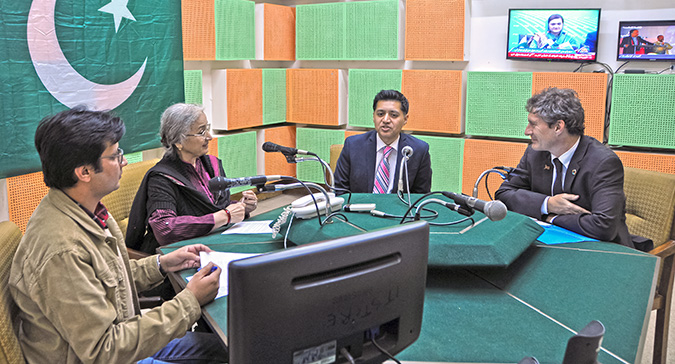UN Pakistan calls for the engagement of men and boys in ending violence against women and girls
Date:
Author: Henriette Bjoerge
Islamabad, Pakistan — Every Wednesday Radio Pakistan’s News and Current Affairs Channel airs a program called ‘Perspective’ highlighting the United Nations (UN) work in Pakistan. On Wednesday 30th of November, Mr. Neil Buhne, Resident Coordinator of UN Pakistan, Mr. Jamshed M Kazi, Country Representative of UN Women, and Ms. Khawar Mumtaz, Chairperson of the National Commission on the Status of Women, joined the program to put focus on the need for a proactive approach by the society to end violence against women in Pakistan, in particular by engaging men and boys.

Mr. Buhne explained that violence against women is a global phenomenon, which affects one third of women around the world. “It happens in poor countries, it happens in rich countries, and it limits women’s development opportunities” he said. Mr. Buhne further highlighted that violence against women is a specific issue within the UN, and that the UN has launched a program in Khyber Pakhtunkhwa to help women easily report incidents of violence against them to the police. He called for more women police officers to be recruited for the purpose. “We need to have more women police officers if we are going to stop violence against women”, he told the listeners.
Speaking in the program, Mr. Jamshed M Kazi said the "16 days of Activism" campaign, which runs every year from 25th of Nov till 10th of Dec, provides women an opportunity to highlight their issues. “Far too many men feel that they have an entitlement, that they are in a superior position, and women have a certain role that they must play”, he said. According to Mr. Kazi, the number of women facing violence in Pakistan is much higher than the global statistics of one in three women. He then told the audience of a program which will be launched in Khyber Pakhtunkhwa in the near future, where women specific buses will be introduced to increase the safety and access to transportation for women. When questioned about how to end violence against women he said: “We have to work on the policy side, the legal side, the law enforcement side and attitudinal side. And it is very important to include this in education”. As an example he mentioned the Punjab government’s decision to include a subject on gender-based violence in the curriculum from Grade 8 to 12 in educational institutions. “This is promising and encouraging development, because unless this is being taught through formal schooling, you may not take it as seriously”, Mr. Kazi said. He further stressed the importance of rewarding positive behavior by men and boys who have the courage to step it up for girls who might be facing violence or are at risk of violence.
Ms. Khawar Mumtaz said that statistics show that 40 per cent of women in Pakistan have faced domestic abuse. In addition to this comes mental, social and economic violence. “The understanding of violence in its various forms is important”, she said. She explained that a systematic approach needs to be developed to address the issue, and mapping of the current situation is crucial. “We have to change behavior inside the house”, she said, and gave examples of caring men who are being ridiculed for changing diapers or looking after children. It is necessary to show good role models of men, and for this the media plays a crucial role, she stated. Further, Ms. Mumtaz stressed that it is very important that women develop an understanding about the issue of violence, for instance not thinking that slapping is ok because she deserves it. Both women and men need to speak up about the issue.
For more information contact:
Henriette Bjoerge
Communications and Advocacy Officer
UN Women Pakistan
Email: Henriette...@unwomen.org